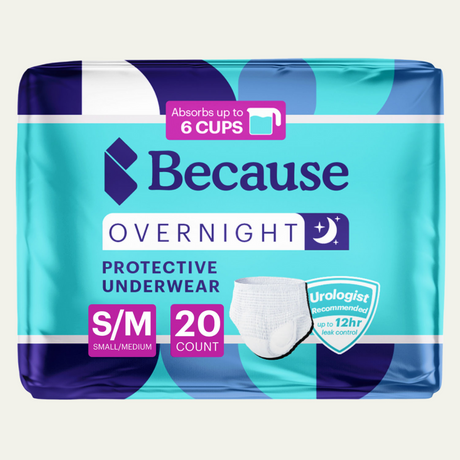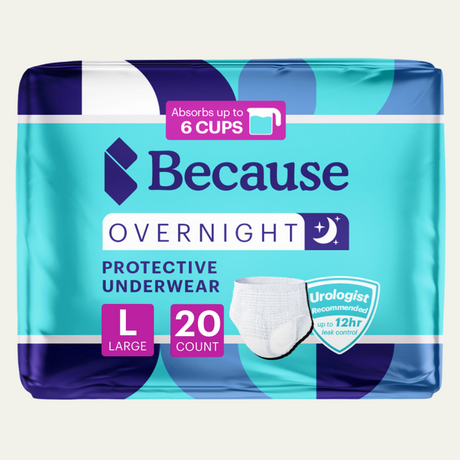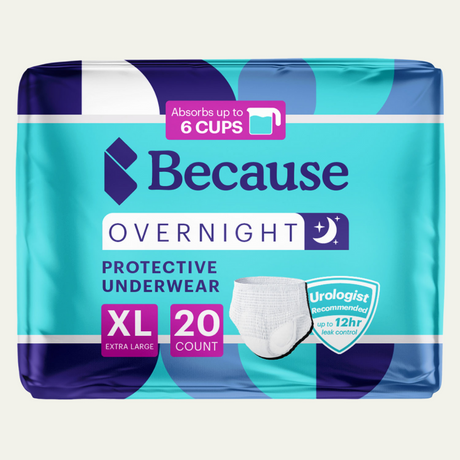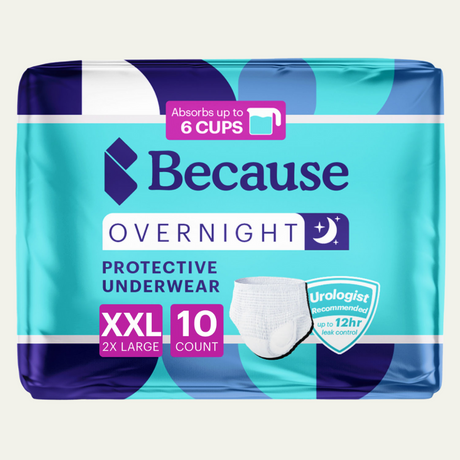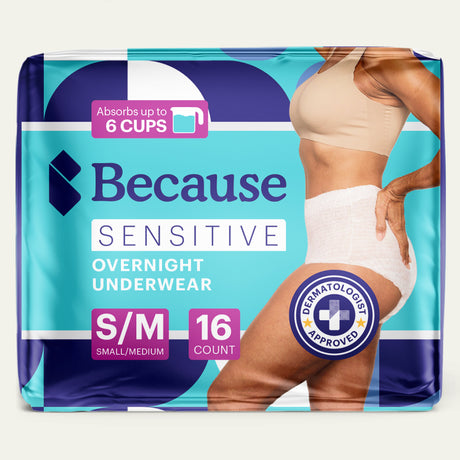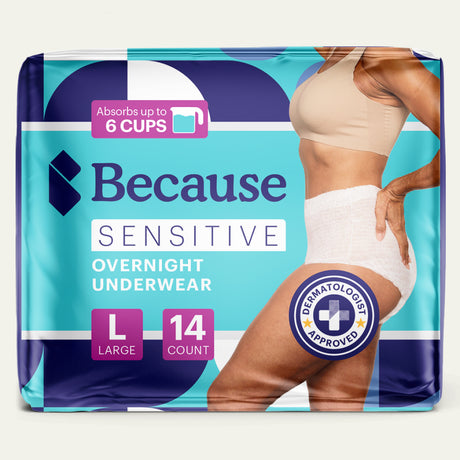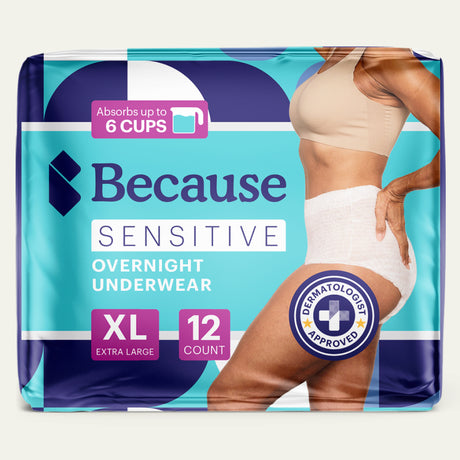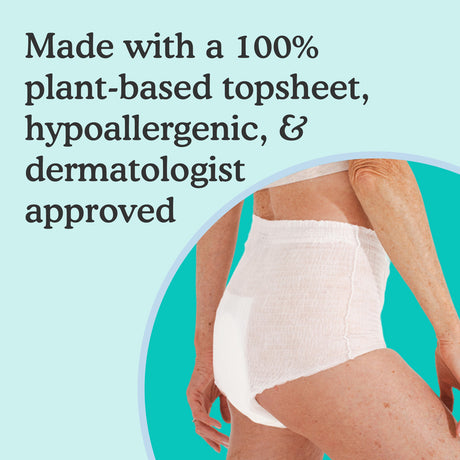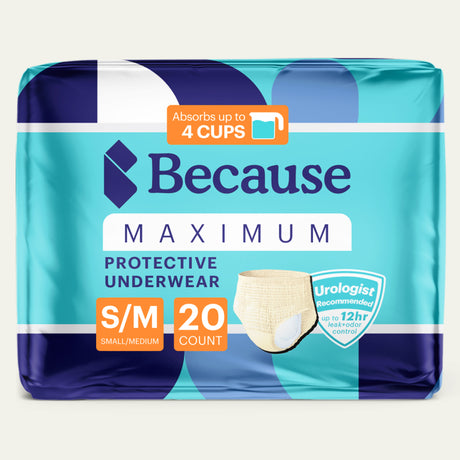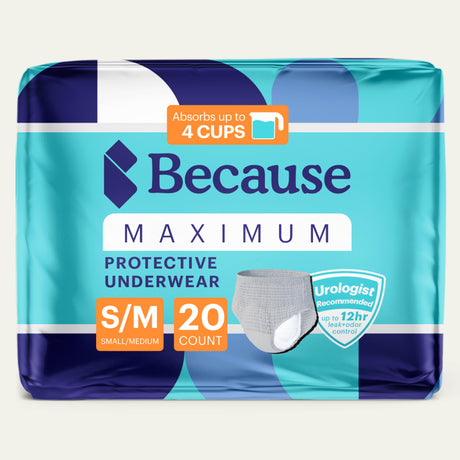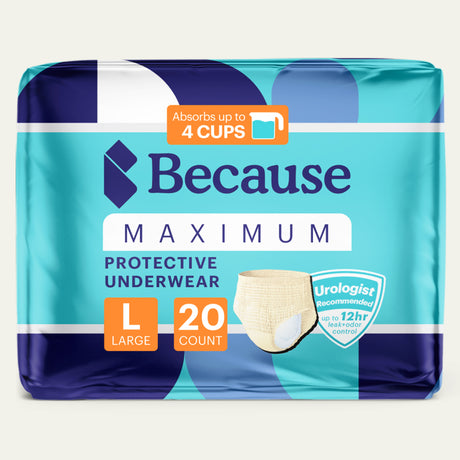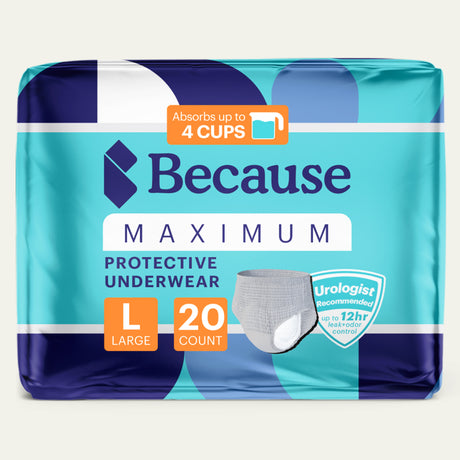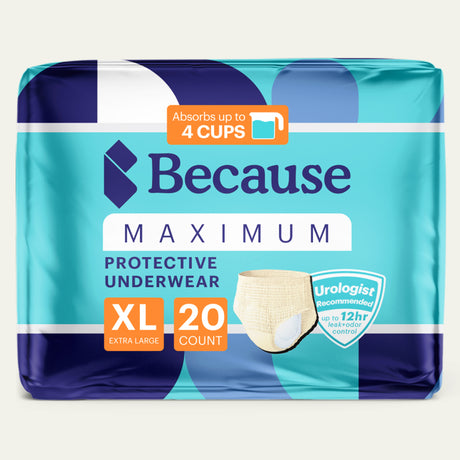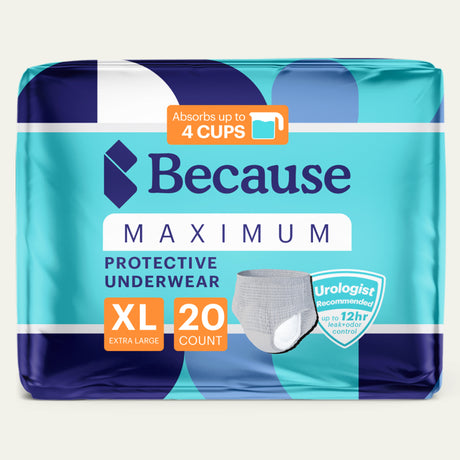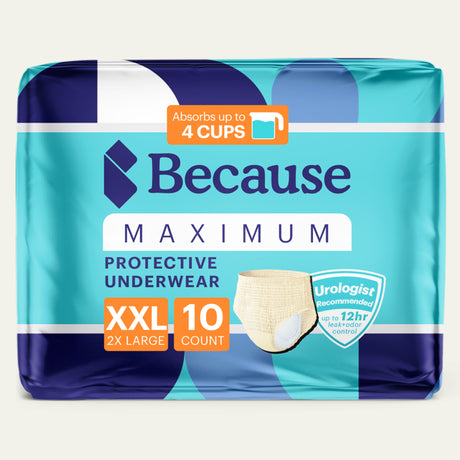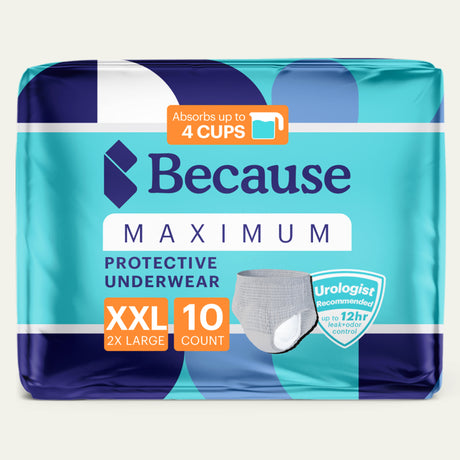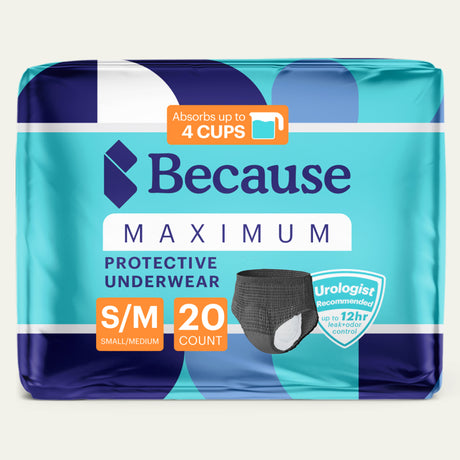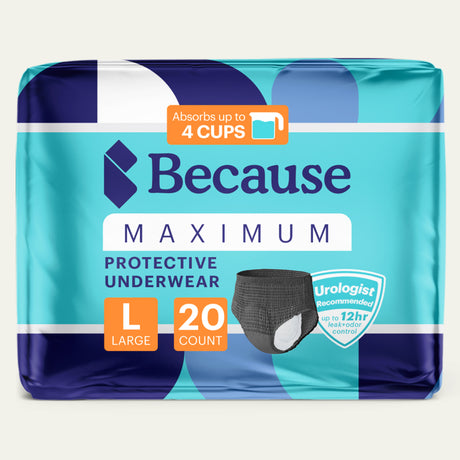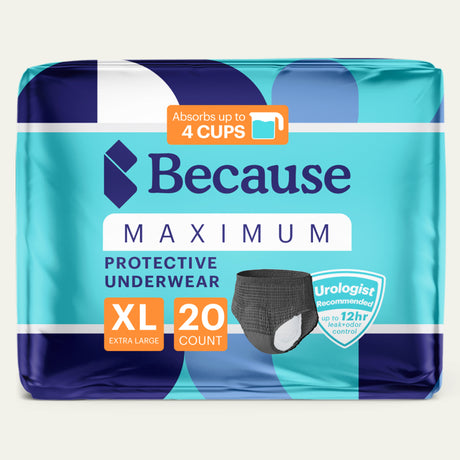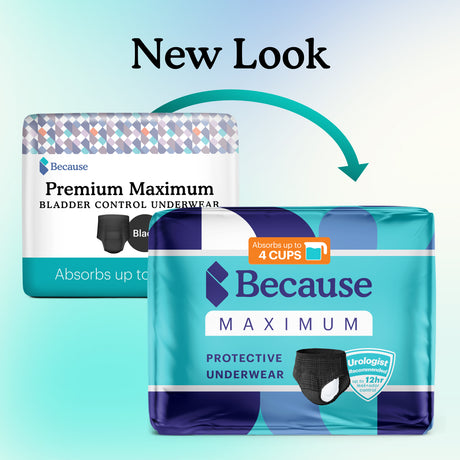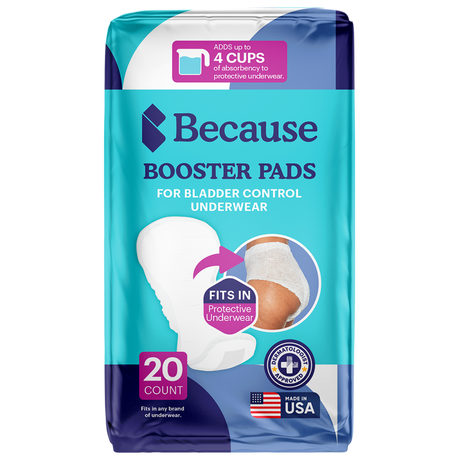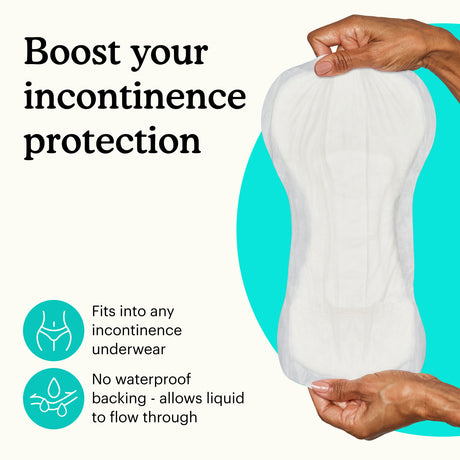Coughing is the body’s natural way of clearing the airways, but a nagging cough can get in the way of your daily activities and sleep. For some men and women, coughing is even more troublesome because it leads to bladder leakage. If you experience peeing when coughing, this post will help you understand why and explore things you can do to address cough incontinence.
Why Do I Cough When I Pee?
Peeing when coughing is usually due to a condition called stress incontinence. We’ll discuss this type of incontinence more in a moment, but basically, coughing temporarily increases abdominal pressure and can result in urine leakage if you have the condition.
Is Cough Incontinence Common?
Stress incontinence is one of the main types of urinary incontinence. Coughing is one of the most common causes of bladder leakage associated with the condition. Although experiencing cough incontinence can cause emotional stress and embarrassment, it is a common problem, and many people you know likely suffer from it as well.
Understanding Stress Incontinence
Simply put, stress incontinence is a loss of bladder control due to having weaker muscles in the pelvic region. The pelvic floor is a group of muscles that support your reproductive organs, lower digestive system, and urinary system. When these lower abdominal muscles become weak, they can’t support the bladder properly. As a result, intra-abdominal pressure exerted on the bladder when you cough can cause urine leaks.
Weakened pelvic floor muscles can also lead to bladder leakage at other times. You may experience incontinence during physical exertion like heavy lifting or exercise. Symptoms of stress incontinence may also occur when you laugh or sneeze.
Some people with urinary stress incontinence also suffer from another type of urinary incontinence called urge incontinence. When these conditions occur together, a physician may diagnose the problem as mixed incontinence. With urge incontinence, the bladder muscle contracts abnormally, leading to a sudden, intense urge to urinate. People with urge incontinence may also need to urinate more frequently due to the movements of their bladder muscles.

Risk Factors for Incontinence When Coughing
Incontinence when coughing usually occurs due to weakness of the muscles of the pelvic floor, and certain people are more at risk for developing pelvic floor dysfunction. Let's take a look at some of the risk factors for cough incontinence.
Age
Stress incontinence can affect men and women of all ages, but it’s most common among older adults. In fact, an estimated three-quarters of women over the age of 75 experiences symptoms of urinary incontinence. Around 11% to 34% percent of older men also deal with the condition.
Hormonal Changes
In women, hormonal changes can make stress incontinence more likely to occur, and this is one of the main reasons why the condition is more common in women. After menopause, levels of estrogen fall sharply, leading to changes in a woman’s pelvic floor muscles as well as the vaginal muscles. These changes mean less support for the bladder and an increased risk for the leakage of urine to occur when you cough, laugh, sneeze, or engage in physical activities.
Pregnancy and Childbirth
Pregnancy and childbirth are also among the most common causes of urinary incontinence when you cough. During pregnancy and vaginal delivery, the pelvic floor muscles become stretched. Performing pelvic floor exercises after the birth of a baby can help restore tone and strength to the muscles. However, many new mothers aren't encouraged to perform these exercises by women’s health providers, and those who are told about them may not have the time or energy to do so while caring for a newborn.
Chronic Cough
People with a chronic cough are more likely to experience peeing when coughing because they’re already more prone to coughing. Even with mild stress incontinence, adults who are prone to coughing may experience frequent leaks. Some conditions that can cause a chronic cough include:
- ACE inhibitor drugs, a class of medication used to treat high blood pressure
- Asthma
- Chronic obstructive pulmonary disease (COPD)
- Gastroesophageal reflux disease (GERD)
- Lung infections like pertussis and tuberculosis
- Post-nasal drip
You may also be more prone to coughing during cold and flu season if you become sick or when you have a sore throat.
Weight
People who are overweight or obese are more prone to forms of stress incontinence, including cough incontinence. Extra weight puts more pressure on the bladder and pelvic muscles, making it more likely that urine will leak with physical movement, coughing, sneezing, and laughing.
Other Medical Conditions
Sometimes, stress incontinence and mixed incontinence develop due to an underlying medical condition, such as:
- Urinary tract infections: When you have a urinary tract infection (UTI), the increased need to urinate may make accidents more likely to occur.
- Diabetes: Damage to the urinary system due to diabetes and increased urination caused by high blood sugar levels can lead to incontinence.
- Nerve damage: Damage to the nerves that control the pelvic floor muscles and/or the bladder caused by an injury, multiple sclerosis (MS), a stroke, or another condition can lead to incontinence.
- Enlarged prostate: In men, an enlarged prostate can put more pressure on the bladder, worsening stress incontinence.
- Prostate surgery: In men, cough incontinence may be one of the side effects of surgery on the prostate. Surgical treatments for prostate cancer may damage nerves or muscles in the pelvic region.
How to Stop Urine Leakage When Coughing
The good news is that you can take steps to reduce peeing when coughing. A combination of pelvic floor muscle exercises, behavior modifications, natural remedies, and medical treatments may lead to an improvement in your symptoms. Read on to learn what you can do about cough incontinence.
Pelvic Floor Exercises
Like other muscles in your body, your pelvic floor can be strengthened through regular exercise. Doctors often recommend Kegel exercises as a first treatment for mild cough incontinence. A physical therapist can teach you the proper technique and perform other pelvic floor therapy interventions to help promote stronger muscles. After a few physical therapy sessions, most patients can then simply continue to do exercises on their own at home.

Lifestyle Modifications
Small lifestyle changes can add up and make a big impact on cough incontinence symptoms. Here are some things that you can do to improve bladder control and promote overall bladder health.
- Drink enough water and other fluids to stay well hydrated.
- Reduce your intake of bladder irritants, like caffeine, spicy foods, and acidic foods.
- Limit alcohol consumption, as drinking increases urine production and can irritate the bladder.
- Eat a healthy diet and exercise regularly to promote weight loss or maintain a healthy weight.
- Stop smoking if you use tobacco.

Bladder Health Supplements
Bladder health supplements can support urinary health and potentially reduce symptoms of stress incontinence and overactive bladder, one of the most common forms of urgency incontinence. With its blend of pumpkin seed and soy germ, Because Bladder Control Daily Supplement helps to strengthen the bladder muscles and has been shown to improve symptoms in as little as seven weeks.
Bladder Training Techniques
Bladder training may benefit both male and female patients with cough incontinence. With bladder training, you establish and keep to a regular urination schedule. At the designated time, you go to the bathroom and try to empty your bladder, even if you don’t feel like you need to go. Gradually, this method can help train your body to urinate at specific times, so you’re less likely to experience leaks.

Medical Interventions
There are a number of medical treatments for stress incontinence and mixed incontinence, including:
- Vaginal pessary: A ring worn inside the vagina that supports the urethra and bladder
- Urethral inserts: Devices that look like miniature tampons that are worn inside the urethra to absorb urine leaks
- Sling procedure: A surgical procedure where a surgeon creates a sling out of mesh, animal tissue, or donor tissue to support the bladder
- Bulking agents: Injections of Bulkamid and other gels that can strengthen the urethra, making urine leakage less likely to occur
- Botox: Injections of botulinum toxin into the bladder. Botox can reduce muscle contractions to ease urge incontinence symptoms.
- Sacral nerve stimulation: An implantable device positioned at the small of the back that delivers electrical stimulation to ease symptoms of urge incontinence. Learn more about sacral nerve stimulation in our blog.
Strategies to Manage Peeing When Coughing
Lifestyle changes and treatments for cough incontinence can be highly effective, but they take time to deliver results. While addressing the underlying causes of peeing while coughing, you can do the following to manage symptoms, keep up with your daily activities, and enjoy an active social life.
Bladder Leak Protection
Bladder leak protection products can help keep your pants and other clothing dry if you experience urine leaks when you cough. You can choose pads and guards that you wear in your underwear or replace your usual undergarments with incontinence underwear. Moderate, maximum, and overnight absorbency level products are available to suit your needs. Which type is right for you depends on how frequently you experience cough incontinence and how much urine you typically pass when leaks occur.
Skin Care and Hygiene
Cough incontinence can lead to skin irritation and odors, but with proper hygiene, you can lower your risk of these issues. Follow these tips to care for your skin while coping with incontinence when coughing:
- Wash your hands thoroughly before and after you change your incontinence protection.
- Change your bladder protection as soon as you can after leaks occur.
- Keep your skin clean with a no-rinse spray or disposable wipes.
- Apply barrier cream to your private area to reduce exposure to moisture.
- Use disposal bags to hold used bladder protection products.
When to Talk to Your Doctor About Cough Incontinence
You don’t need to wait until symptoms of cough incontinence are severe to seek medical advice. In fact, talking to your doctor about cough incontinence early could make the condition easier to address. Make an appointment with your medical provider to explore treatment options that may benefit you.
Looking for bladder protection products to help you deal with cough incontinence? Take our bladder protection quiz and get a sample pack to try.
If you're struggling with incontinence, join one of our private support groups today!
Women's Incontinence Support Group
Men's Incontinence Support Group
Sources:
Mayo Clinic Health System. (n.d.). Is Urine Incontinence Normal for Women? Retrieved from https://www.mayoclinichealthsystem.org/hometown-health/speaking-of-health/is-urine-incontinence-normal-for-women
Mayo Clinic Health System. (n.d.). Is Urine Incontinence Normal for Women? Retrieved from https://www.mayoclinichealthsystem.org/hometown-health/speaking-of-health/is-urine-incontinence-normal-for-women
Burgio, K. L., Matthews, K. A., Engel, B. T., & Hawkins, K. (2010). Urinary incontinence in the 12-month postpartum period. Obstetrics and Gynecology, 115(2 Pt 1), 249-254. doi: 10.1097/AOG.0b013e3181cb5d2d. Retrieved from https://www.sciencedirect.com/science/article/abs/pii/S0090429510000191


